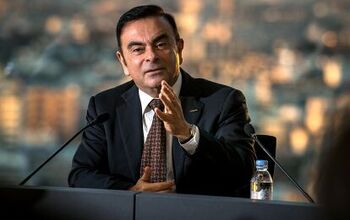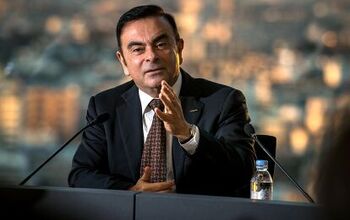Shareholders Boot Carlos Ghosn From Nissan Board

Nissan wasted no time in dropping Carlos Ghosn as company chairman after his initial November arrest, but the nature of business meant shareholders had to meet to vote him off the board. That meeting took place Monday morning in a Tokyo hotel.
There, some 4,119 shareholders gathered to break Ghosn’s last tie to the company he commanded for two decades. They also put some heat on company brass.
During the meeting, shareholders heard an apology from Nissan CEO Hiroto Saikawa, who recently announced his plan to forego retirement and stay on as chief executive.
“We have to admit that there was a significant problem with our corporate governance,” Saikawa said, adding that he was “extremely shocked when I learned of the misconduct.”
Alliance partner Renault waited for more evidence before dropping Ghosn as chairman and CEO, while Mitsubishi cut Ghosn loose as chairman around the same time as Nissan. Also gone from Nissan’s board is Greg Kelly, former representative director and Ghosn’s right-hand man. Japanese authorities nabbed Kelly on the same financial misconduct charges as Ghosn, alleging the aide conspired to underreport Ghosn’s income to Japanese regulators.
Ghosn, 65, has racked up three charges and four arrests, the most recent coming last week, immediately before the ousted exec planned to air his story in a media broadcast. In an act of alliance fence-mending, Nissan shareholders placed newly minted Renault chairman Jean-Dominique Senard in Ghosn’s vacated director position.
The latest charge is a convoluted one, but it basically amounts to improper use of Nissan funds. According to prosecutors, Ghosn funnelled $15 million to an Oman Nissan dealership, then used a third of that money for his own personal use. Prosecutors claim Ghosn used the $5 million to purchase a yacht.
The former chairman vigorously denies any wrongdoing, claiming the charges are part of a Nissan-orchestrated plot to oust him from the company he helped save.
Many shareholders present at Monday’s meeting preferred to see a cleaner sweep of Nissan’s upper ranks, but Saikawa held firm, claiming his presence was needed to solidify the shaky alliance.
“Once I’ve done these things thoroughly and the situation has moved to the point where we can pass the torch … I’ll think about what to do with myself,” he told the room.
More developments in the Ghosn saga arose in recent days. First, Nissan’s board moved to strip Ghson of his no doubt hefty pension; second, Renault’s Ethics and Compliance Department delivered its report into potential financial misconduct on the part of its former CEO. The automaker’s board reports “potential issues concerning payments made to one of Renault’s distributors in the Middle East.”
Meanwhile, Ghosn’s wife, who has strongly condemned her husband’s treatment at the hands of Japanese authorities, fled Japan on the weekend. Claiming she “felt in danger” after her husband’s masot recent arrest, Carole Ghosn made her way out of the country with the help of the French ambassador.
[Sources: France 24, The Japan Times] [Image: Nissan]

More by Steph Willems
Latest Car Reviews
Read moreLatest Product Reviews
Read moreRecent Comments
- Honda1 Unions were needed back in the early days, not needed know. There are plenty of rules and regulations and government agencies that keep companies in line. It's just a money grad and nothing more. Fain is a punk!
- 1995 SC If the necessary number of employees vote to unionize then yes, they should be unionized. That's how it works.
- Sobhuza Trooper That Dave Thomas fella sounds like the kind of twit who is oh-so-quick to tell us how easy and fun the bus is for any and all of your personal transportation needs. The time to get to and from the bus stop is never a concern. The time waiting for the bus is never a concern. The time waiting for a connection (if there is one) is never a concern. The weather is never a concern. Whatever you might be carrying or intend to purchase is never a concern. Nope, Boo Cars! Yeah Buses! Buses rule!Needless to say, these twits don't actual take the damn bus.
- MaintenanceCosts Nobody here seems to acknowledge that there are multiple use cases for cars.Some people spend all their time driving all over the country and need every mile and minute of time savings. ICE cars are better for them right now.Some people only drive locally and fly when they travel. For them, there's probably a range number that works, and they don't really need more. For the uses for which we use our EV, that would be around 150 miles. The other thing about a low range requirement is it can make 120V charging viable. If you don't drive more than an average of about 40 miles/day, you can probably get enough electrons through a wall outlet. We spent over two years charging our Bolt only through 120V, while our house was getting rebuilt, and never had an issue.Those are extremes. There are all sorts of use cases in between, which probably represent the majority of drivers. For some users, what's needed is more range. But I think for most users, what's needed is better charging. Retrofit apartment garages like Tim's with 240V outlets at every spot. Install more L3 chargers in supermarket parking lots and alongside gas stations. Make chargers that work like Tesla Superchargers as ubiquitous as gas stations, and EV charging will not be an issue for most users.
- MaintenanceCosts I don't have an opinion on whether any one plant unionizing is the right answer, but the employees sure need to have the right to organize. Unions or the credible threat of unionization are the only thing, history has proven, that can keep employers honest. Without it, we've seen over and over, the employers have complete power over the workers and feel free to exploit the workers however they see fit. (And don't tell me "oh, the workers can just leave" - in an oligopolistic industry, working conditions quickly converge, and there's not another employer right around the corner.)































Comments
Join the conversation
"Meanwhile, Ghosn’s wife, who has strongly condemned her husband’s treatment at the hands of Japanese authorities, fled Japan on the weekend. Claiming she “felt in danger” after her husband’s masot recent arrest, Carole Ghosn made her way out of the country with the help of the French ambassador." Good.
Anything with “Renault” and “Alliance” in it cracks me up! :-) And as I always ask, what’ll they do for an Encore?!